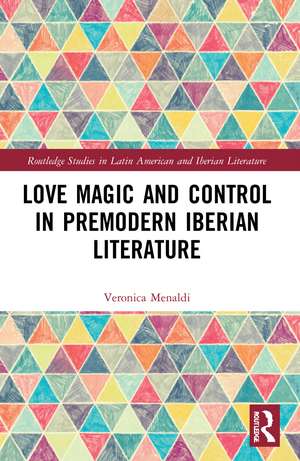Love Magic and Control in Premodern Iberian Literature: Routledge Studies in Latin American and Iberian Literature
Autor Veronica Menaldien Limba Engleză Paperback – 31 mai 2023
| Toate formatele și edițiile | Preț | Express |
|---|---|---|
| Paperback (1) | 380.78 lei 6-8 săpt. | |
| Taylor & Francis – 31 mai 2023 | 380.78 lei 6-8 săpt. | |
| Hardback (1) | 992.90 lei 6-8 săpt. | |
| Taylor & Francis – 30 iul 2021 | 992.90 lei 6-8 săpt. |
Preț: 380.78 lei
Nou
Puncte Express: 571
Preț estimativ în valută:
72.93€ • 75.14$ • 61.09£
72.93€ • 75.14$ • 61.09£
Carte tipărită la comandă
Livrare economică 22 februarie-08 martie
Preluare comenzi: 021 569.72.76
Specificații
ISBN-13: 9781032051116
ISBN-10: 1032051116
Pagini: 168
Dimensiuni: 152 x 229 x 9 mm
Greutate: 0.31 kg
Ediția:1
Editura: Taylor & Francis
Colecția Routledge
Seria Routledge Studies in Latin American and Iberian Literature
Locul publicării:Oxford, United Kingdom
ISBN-10: 1032051116
Pagini: 168
Dimensiuni: 152 x 229 x 9 mm
Greutate: 0.31 kg
Ediția:1
Editura: Taylor & Francis
Colecția Routledge
Seria Routledge Studies in Latin American and Iberian Literature
Locul publicării:Oxford, United Kingdom
Public țintă
PostgraduateCuprins
Introduction: Love Magic as a Metaphor for Control and Admiration
Convivencia, Courtly Love, and Categorizing Magic
1. Thirteenth-Century Alfonso X’s Interest in Andalusi and Islamic Magic
Eucharists as Magical Chastity Belts in Cantiga 104
Demons as Tools for Magical Seduction in Cantiga 125
2. Enchanted Spaces as Sites of Melding Thirteenth/Fourteenth-Century Knowledge
Marriage and Temptation in the Sulfuric Lake in the Libro del Caballero Zifar
The Devil’s Seduction of Roboán and His Loss of the Fortunate Isles in the Zifar
3. Transgressive Clerical Employment of Fourteenth-Century Go-Betweens
Amorous Linguistic Enchantments in Libro de buen amor
4. Sephardi and Andalusi Influences in Fifteenth- and Sixteenth-Century Mediators
Match-Maker Celestina’s Pantry of Herbs and Medicinal Supplies
The Cord that Broke Courtly Love in Celestina
5. Lingering Morisco Practices in Seventeenth-Century Imaginary
Medieval Inspirations for Feminine Empowerment and Meddling Neighbors and Mediated Trickery of the Innocent
Nocturnal Trace-Induced Intimacy by Moorish Necromancer in "La inocencia castigada"
Conclusion
Convivencia, Courtly Love, and Categorizing Magic
1. Thirteenth-Century Alfonso X’s Interest in Andalusi and Islamic Magic
Eucharists as Magical Chastity Belts in Cantiga 104
Demons as Tools for Magical Seduction in Cantiga 125
2. Enchanted Spaces as Sites of Melding Thirteenth/Fourteenth-Century Knowledge
Marriage and Temptation in the Sulfuric Lake in the Libro del Caballero Zifar
The Devil’s Seduction of Roboán and His Loss of the Fortunate Isles in the Zifar
3. Transgressive Clerical Employment of Fourteenth-Century Go-Betweens
Amorous Linguistic Enchantments in Libro de buen amor
4. Sephardi and Andalusi Influences in Fifteenth- and Sixteenth-Century Mediators
Match-Maker Celestina’s Pantry of Herbs and Medicinal Supplies
The Cord that Broke Courtly Love in Celestina
5. Lingering Morisco Practices in Seventeenth-Century Imaginary
Medieval Inspirations for Feminine Empowerment and Meddling Neighbors and Mediated Trickery of the Innocent
Nocturnal Trace-Induced Intimacy by Moorish Necromancer in "La inocencia castigada"
Conclusion
Notă biografică
Veronica Menaldi is an assistant professor of Spanish in the Department of Modern Languages at the University of Mississippi. She received her PhD from the Department of Spanish and Portuguese Studies at the University of Minnesota in 2018. Her research focuses on premodern (medieval and early modern) Iberian literatures and cultures with an emphasis on magic, food, and cultural contact. She has articles and chapters published on Castilian and Aljamiado spells and fictions in conjunction with Andalusi, Latin, and Sephardi grimoires; and in-progress articles on the use of foodstuff in similar Iberian texts.
Recenzii
"Menaldi’s book is an exemplary addition to historical Iberian magical research as well as a tribute to the memory of Iberia’s rich diverse past." - Jennifer Corry, Berry College
Descriere
This book explores various representations and productions of love magic in medieval and early modern Iberian fictions. The use of magic serves as a metaphor for issues of control and exchange of knowledge among the various religious identities of the Peninsula throughout the centuries.












